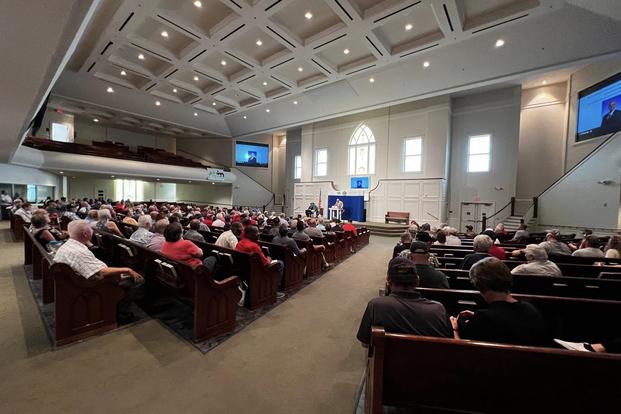Surviving spouses, dependent children and some parents of deceased U.S. military veterans may have become newly eligible for compensation following Congress's creation of the PACT Act in 2022. Survivors may even qualify for backdated compensation if they filed a claim following the death of their family member from a now-"presumptive" medical condition that was originally denied.
Here are some of the most important things survivors need to know if they think they may qualify:
New Conditions Considered 'Presumptive' Under the PACT Act
The PACT Act linked a variety of medical conditions with some toxins common during specific eras or circumstances of military service.
Rather than require veterans or their survivors to prove that a toxic exposure took place, the law assumes that some illnesses are service-connected if the person served in certain places during specific time frames. If a veteran exposed to burn pits in Afghanistan, for example, died because of kidney cancer, a condition not previously covered, their survivor could now be eligible for Dependency and Indemnity Compensation.
The following burn pit- and other toxic exposure-related conditions became presumptive under the PACT Act:
- Brain cancer
- Gastrointestinal cancer of any type
- Glioblastoma
- Head cancer of any type
- Kidney cancer
- Lymphoma of any type
- Melanoma
- Neck cancer of any type
- Pancreatic cancer
- Reproductive cancer of any type
- Respiratory (breathing-related) cancer of any type
- Asthma that was diagnosed after service
- Chronic bronchitis
- Chronic obstructive pulmonary disease (COPD)
- Chronic rhinitis
- Chronic sinusitis
- Constrictive bronchiolitis or obliterative bronchiolitis
- Emphysema
- Granulomatous disease
- Interstitial lung disease (ILD)
- Pleuritis
- Pulmonary fibrosis
- Sarcoidosis
The following conditions related to Vietnam-era Agent Orange exposure became presumptive under the PACT Act:
- High blood pressure (also called hypertension)
- Monoclonal gammopathy of undetermined significance (MGUS)
Survivors May Be Entitled to Retroactive Benefits
In two instances, survivors of veterans who died of a newly presumptive condition may be able to recover some backdated compensation.
Previously denied Dependency and Indemnity Compensation: The DIC benefit pays monthly allowances to survivors of military members who die while on active duty or while training, or veterans who die as the result of a service-related injury or disease. The Department of Veterans Affairs says it will try to contact survivors who filed DIC claims in the past and may be newly eligible. However, there is no reason to wait. Go ahead and submit a new application here to reapply.
Previously denied accrued benefits: If a survivor applied not only for DIC but also accrued benefits within a year of a veteran's death -- benefits the veteran would have received while they were alive had their condition already been covered -- a survivor may now be able to claim those accrued benefits as well. An accredited VA claim representative can help with filing.
When Does a Survivor Qualify for PACT Act Benefits?
The VA supplied the following examples to Military.com to help survivors get an idea of whether they may qualify for compensation under the PACT Act:
- Veteran A, who deployed to Afghanistan in 2008, never filed for benefits but died of lung cancer in 2019. Veteran A's spouse did not apply for benefits at the time of the veteran's death. If Veteran A's spouse files a claim on or before Aug. 9, 2023, the spouse can be granted benefits back to Aug. 10, 2022. (Learn more about the Aug. 9, 2023, deadline for backdated benefits here.)
- Veteran B deployed to the Persian Gulf in 2002 and died unexpectedly of brain cancer in 2017. Veteran B's spouse applied for benefits in March 2017 but was denied. The spouse can now reapply, elect a reevaluation of the previously denied claim, and can be granted benefits back to March 2017.
- Veteran C, who served in Iraq, filed a claim in November 2021 for glioblastoma, and the VA denied it. Veteran C died in February 2022 of glioblastoma. Veteran C's surviving spouse applied for DIC and accrued benefits on Oct. 6, 2022, within one year of the veteran's death. The spouse could be eligible for two benefits: 1) the accrued benefits from November 2021 to February 2022 -- what the veteran would have received; and 2) DIC back to Aug. 10, 2022, the date President Joe Biden signed the PACT Act into law. (Learn more about the Aug. 9, 2023, deadline for backdated benefits here.)
Keep Up with the Ins and Outs of Military Life
For the latest military news and tips on military family benefits and more, subscribe to Military.com and have the information you need delivered directly to your inbox.











